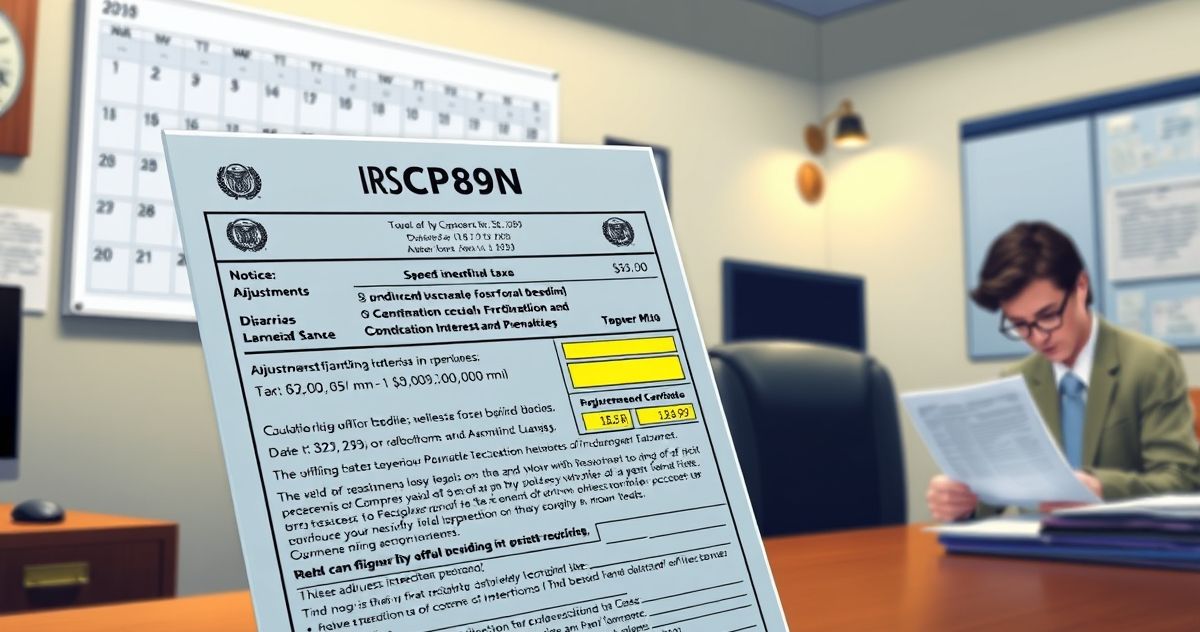Understanding the CP89N Notice
The CP89N Notice is a communication issued by the Internal Revenue Service (IRS) to inform taxpayers of significant changes made to their tax account. These changes are typically the result of discrepancies identified by the IRS, which may arise from errors or omissions in previously filed tax returns. The notice serves as an essential tool for ensuring that taxpayers are aware of any adjustments to their tax accounts, thus allowing them to take necessary actions to rectify any issues.
Primary Purpose of the CP89N Notice
The primary objective of the CP89N Notice is to communicate to taxpayers that the IRS has made adjustments to their tax account. These adjustments could pertain to recalculated refunds, additional tax owed, or corrections to reported income, credits, or deductions. By issuing this notice, the IRS aims to maintain transparency and clarity in taxpayer accounts, ensuring taxpayers are informed about and can address potential discrepancies and compliance issues promptly.
Key Features of the CP89N Notice
- Explanation of Adjustments: The CP89N Notice provides a detailed explanation of any changes made to a taxpayer’s account. It highlights the specific items adjusted and the reasons for each adjustment. Common areas of adjustments include corrections to reported income, credit modifications, and recalculated deductions.
- Impact on Refunds or Balances: The notice details how the adjustments will affect any refunds or balances due. It specifies whether a taxpayer has a revised balance due, an updated refund amount, or possibly both.
- Interest and Penalties: If adjustments result in underpayment of taxes, the notice includes information on potential interest and penalties, giving precise amounts and due dates for any payments required.
Filing and Compliance Requirements
Taxpayers who receive a CP89N Notice should review the details carefully and determine what actions are required. Compliance involves understanding the adjustments, potentially making additional tax payments, and rectifying any ongoing discrepancies.
- Required Actions: Taxpayers may need to pay any balance due by a specified deadline. If they disagree with the adjustments, they have the option to dispute the notice through the IRS-provided channels, which may require supplying additional documentation.
- Amended Returns: In cases where errors remain unaddressed, filing an amended return might be necessary. The IRS provides resources and instructions for completing this process.
Consequences for Non-Compliance
Ignoring or failing to act on a CP89N Notice can have serious ramifications. Non-compliance can aggravate financial burdens through increased penalties and interest, and may result in enforcement actions by the IRS.
- Increased Penalties: Unresolved balances accrue penalties over time, which compound the taxpayer’s debt.
- Enforcement Actions: The IRS may resort to collections, such as liens or levies, should taxpayers fail to address outstanding balances.
- Potential Audits: Repeated neglect of discrepancies or failure to respond to IRS notices increases the prospect of an audit in future tax years.
Importance in Tax Resolution
The CP89N Notice is crucial for tax debt resolution and overall financial compliance. By acknowledging discrepancies early, taxpayers can minimize penalties, settle accounts, and prevent future issues with the IRS. The CP89N provides the opportunity to negotiate repayment options or explore tax relief alternatives.
- Prompt Response: By addressing issues raised in the CP89N Notice promptly, taxpayers can reduce accruing penalties and interest.
- Preventive Measures: It serves as a reminder to taxpayers to ensure the accuracy of future filings, encouraging a proactive approach toward financial management. This includes verifying all income sources and credits and maintaining thorough documentation.
- Leveraging IRS Tools: Taxpayers can utilize IRS resources, such as the IRS Online Account, to keep informed about their tax status and address discrepancies as they arise.
Conclusion
The CP89N Notice plays a vital role in maintaining accurate tax accounts and effective financial management. Timely and compliant handling of notices supports taxpayers in mitigating additional financial liabilities and ensuring adherence to IRS guidelines. Each notice serves as a critical intersection of IRS transparency and taxpayer responsibility, fostering an environment of mutual understanding and resolution strategies.

